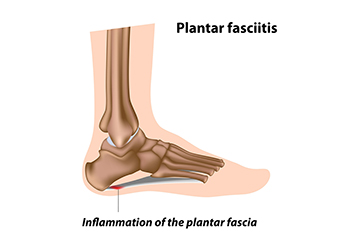Items filtered by date: October 2023
Choosing Socks for Sweaty Feet

Sweaty feet can be more than just an inconvenience. They can lead to a host of problems, ranging from blisters and fungal infections to bacterial growth. With approximately 4.8 percent of the population dealing with hyperhidrosis, it is clear that many individuals are searching for solutions to keep their feet dry and comfortable. One effective way to manage this situation is by choosing the right socks, which can play an important role in keeping your feet moisture free and safer from infection. The soles of your feet have more sweat glands than any other part of your body. These sweat glands are essential for temperature regulation, but for those with hyperhidrosis, they can become overactive and lead to excessive perspiration. This not only causes discomfort, but also poses various health risks. A number of issues need to be taken into consideration when choosing socks for hyperhidrosis, including materials, breathability, construction, fit, and safety. If you are unsure about the best sock choices for your feet, it is suggested that you speak with a podiatrist, who can offer expert advice tailored to your needs.
If you are suffering from hyperhidrosis contact one of our podiatrists of DeCaro Total Foot Care Center. Our doctors can provide the care you need to attend to all of your foot and ankle needs.
Hyperhidrosis of the Feet
Hyperhidrosis is a rare disorder that can cause people to have excessive sweating of their feet. This can usually occur all on its own without rigorous activity involved. People who suffer from hyperhidrosis may also experience sweaty palms.
Although it is said that sweating is a healthy process meant to cool down the body temperature and to maintain a proper internal temperature, hyperhidrosis may prove to be a huge hindrance on a person’s everyday life.
Plantar hyperhidrosis is considered to be the main form of hyperhidrosis. Secondary hyperhidrosis can refer to sweating that occurs in areas other than the feet or hands and armpits. Often this may be a sign of it being related to another medical condition such as menopause, hyperthyroidism and even Parkinson’s disease.
In order to alleviate this condition, it is important to see your doctor so that they may prescribe the necessary medications so that you can begin to live a normal life again. If this is left untreated, it is said that it will persist throughout an individual’s life.
A last resort approach would be surgery, but it is best to speak with your doctor to find out what may be the best treatment for you.
If you have any questions please feel free to contact our office located in West Hatfield, MA . We offer the newest diagnostic and treatment technologies for all your foot and ankle needs.
Erythromelalgia in the Feet

Erythromelalgia is a genetic condition characterized by recurrent bouts of pain, redness, and swelling, primarily in the hands and feet. These episodes are frequently triggered by elevated body temperature, which can result from activities like exercising or being in a warm environment. Consumption of alcohol or spicy foods can also provoke these painful episodes. Oddly enough, even wearing warm socks or tight shoes can induce debilitating foot pain, hindering daily activities like walking, wearing shoes, or functioning normally. The signs and symptoms of erythromelalgia in the feet typically emerge during childhood, although some mildly affected individuals may experience their initial episode later in life. As the condition progresses with age, the redness and discomfort may become chronic, extending from the feet to the entire legs. Erythromelalgia is often classified as a type of peripheral neuropathy, impacting the peripheral nervous system. This system links the brain and spinal cord to muscles and sensory receptors responsible for detecting sensations such as touch and pain. If you think you might have erythromelalgia or any type of foot pain, it is suggested that you make an appointment with a podiatrist for a proper diagnosis and treatment.
Foot Pain
Foot pain can be extremely painful and debilitating. If you have a foot pain, consult with one of our podiatrists from DeCaro Total Foot Care Center. Our doctors will assess your condition and provide you with quality foot and ankle treatment.
Causes
Foot pain is a very broad condition that could be caused by one or more ailments. The most common include:
- Bunions
- Hammertoes
- Plantar Fasciitis
- Bone Spurs
- Corns
- Tarsal Tunnel Syndrome
- Ingrown Toenails
- Arthritis (such as Gout, Rheumatoid, and Osteoarthritis)
- Flat Feet
- Injury (from stress fractures, broken toe, foot, ankle, Achilles tendon ruptures, and sprains)
- And more
Diagnosis
To figure out the cause of foot pain, podiatrists utilize several different methods. This can range from simple visual inspections and sensation tests to X-rays and MRI scans. Prior medical history, family medical history, and any recent physical traumatic events will all be taken into consideration for a proper diagnosis.
Treatment
Treatment depends upon the cause of the foot pain. Whether it is resting, staying off the foot, or having surgery; podiatrists have a number of treatment options available for foot pain.
If you have any questions, please feel free to contact our office located in West Hatfield, MA . We offer the newest diagnostic and treatment technologies for all your foot care needs.
Get Proper Treatment for Ankle Injuries
Symptoms of a Foot Stress Fracture

Stress fractures are small, hairline cracks in bones, often resulting from repetitive or excessive force on the affected area. These fractures can occur in various parts of the body, but they are frequently seen in weight-bearing bones such as the feet. Recognizing the symptoms of a stress fracture is essential for early intervention. One common sign is localized pain, typically described as a deep, aching discomfort that worsens with activity and may improve with rest. Swelling and tenderness at the fracture site are also common, often accompanied by a pinpoint area of pain. Unlike acute fractures, stress fractures may not always cause noticeable bruising or deformity. Left untreated, stress fractures can lead to more severe injuries. If you suspect you have a foot stress fracture, it is suggested that you seek medical attention from a podiatrist promptly to prevent further damage and ensure proper healing.
Stress fractures occur when there is a tiny crack within a bone. To learn more, contact one of our podiatrists from DeCaro Total Foot Care Center. Our doctors can provide the care you need to keep you pain free and on your feet.
How Are They Caused?
Stress fractures are the result of repetitive force being placed on the bone. Since the lower leg and feet often carry most of the body’s weight, stress fractures are likely to occur in these areas. If you rush into a new exercise, you are more likely to develop a stress fracture since you are starting too much, too soon. Pain resulting from stress fractures may go unnoticed at first, however it may start to worsen over time.
Risk Factors
- Gender – They are more commonly found in women compared to men.
- Foot Problems – People with unusual arches in their feet are more likely to develop stress fractures.
- Certain Sports – Dancers, gymnasts, tennis players, runners, and basketball players are more likely to develop stress fractures.
- Lack of Nutrients – A lack of vitamin D and calcium may weaken the bones and make you more prone to stress fractures
- Weak Bones – Osteoporosis can weaken the bones therefore resulting in stress fractures
Stress fractures do not always heal properly, so it is important that you seek help from a podiatrist if you suspect you may have one. Ignoring your stress fracture may cause it to worsen, and you may develop chronic pain as well as additional fractures.
If you have any questions, please feel free to contact our office located in West Hatfield, MA . We offer the newest diagnostic and treatment technologies for all your foot care needs.
Getting Help for Plantar Fasciitis

Plantar fasciitis is believed to be the most common complaint of heel pain. Plantar fasciitis is the inflammation of the plantar fascia, a broad band of tissue on the sole that supports the arch. This inflammation can make your heel hurt, swell, or turn red, particularly when getting out of bed in the morning. The causes of plantar fasciitis are varied, often stemming from factors like foot and calf tightness, weak foot muscles, or undue stress on the arch. Excessive running, wearing poorly fitted shoes, and some work actions can make the condition worse. Treatment focuses on addressing the root causes and reducing inflammation. It may involve wearing shoes with better arch support, changing shoe size, and moderating activities that strain the foot. Stretching and strengthening exercises, like towel curls, may help reduce symptoms. If you have developed plantar fasciitis, it is suggested that you make an appointment with a podiatrist who specializes in managing this condition.
Plantar fasciitis can be very painful and inconvenient. If you are experiencing heel pain or symptoms of plantar fasciitis, contact one of our podiatrists from DeCaro Total Foot Care Center. Our doctors can provide the care you need to keep you pain-free and on your feet.
What Is Plantar Fasciitis?
Plantar fasciitis is the inflammation of the thick band of tissue that runs along the bottom of your foot, known as the plantar fascia, and causes mild to severe heel pain.
What Causes Plantar Fasciitis?
- Excessive running
- Non-supportive shoes
- Overpronation
- Repeated stretching and tearing of the plantar fascia
How Can It Be Treated?
- Conservative measures – anti-inflammatories, ice packs, stretching exercises, physical therapy, orthotic devices
- Shockwave therapy – sound waves are sent to the affected area to facilitate healing and are usually used for chronic cases of plantar fasciitis
- Surgery – usually only used as a last resort when all else fails. The plantar fascia can be surgically detached from the heel
While very treatable, plantar fasciitis is definitely not something that should be ignored. Especially in severe cases, speaking to your doctor right away is highly recommended to avoid complications and severe heel pain. Your podiatrist can work with you to provide the appropriate treatment options tailored to your condition.
If you have any questions please feel free to contact our office located in West Hatfield, MA . We offer the newest diagnostic and treatment technologies for all your foot and ankle needs.
Common Sources of Heel Pain

Heel pain can be a real hindrance, affecting your daily life and mobility. Recognizing symptoms of heel pain helps you identify the cause and find relief. Plantar fasciitis is the most common complaint associated with heel pain. It often causes a sharp pain in the heel, especially in the morning. This condition occurs when the plantar fascia, the tissue connecting your heel bone to your toes, becomes inflamed. Achilles tendinitis results in pain in the back of the heel as the Achilles tendon, which connects the calf muscles to the heel bone, is torn and becomes inflamed. Heel spurs, bony growths on the underside of the heel bone, often accompany conditions like plantar fasciitis and may induce further pain. Bursitis, the inflammation of the bursa sacs around the heel, can lead to pain when walking or wearing tight-fitting shoes. Stress fractures, tiny cracks in the heel bone caused by repetitive stress, result in localized pain. If you're experiencing heel pain, it is suggested that you make an appointment with a podiatrist for an examination and a diagnosis. Then this medically trained foot doctor can formulate a personalized treatment plan to get you back on your feet pain-free.
Many people suffer from bouts of heel pain. For more information, contact one of our podiatrists of DeCaro Total Foot Care Center. Our doctors can provide the care you need to keep you pain-free and on your feet.
Causes of Heel Pain
Heel pain is often associated with plantar fasciitis. The plantar fascia is a band of tissues that extends along the bottom of the foot. A rip or tear in this ligament can cause inflammation of the tissue.
Achilles tendonitis is another cause of heel pain. Inflammation of the Achilles tendon will cause pain from fractures and muscle tearing. Lack of flexibility is also another symptom.
Heel spurs are another cause of pain. When the tissues of the plantar fascia undergo a great deal of stress, it can lead to ligament separation from the heel bone, causing heel spurs.
Why Might Heel Pain Occur?
- Wearing ill-fitting shoes
- Wearing non-supportive shoes
- Weight change
- Excessive running
Treatments
Heel pain should be treated as soon as possible for immediate results. Keeping your feet in a stress-free environment will help. If you suffer from Achilles tendonitis or plantar fasciitis, applying ice will reduce the swelling. Stretching before an exercise like running will help the muscles. Using all these tips will help make heel pain a condition of the past.
If you have any questions please contact our office located in West Hatfield, MA . We offer the newest diagnostic and treatment technologies for all your foot and ankle needs.

